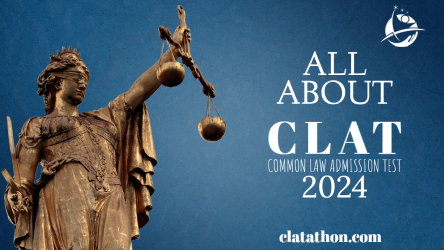CLAT 2024 Exam Date, Application Form, Eligibility Criteria, Syllabus, Exam Pattern and Result
The Common Law Admission Test (CLAT) is a national-level entrance exam conducted by the Consortium of National Law Universities (NLUs) every year to provide Under-Graduate (UG) and Post-Graduate (PG) Law Programmes offered by 24 NLUs.
Approximately 90,000 students appeared for CLAT 2023, a number that keeps on increasing every year.
CLAT Aspirants look forward to getting into the top ranks and admissions to India's best law institutions through CLAT 2024. Aspirants work hard to get admission to the top National Law Universities such as National Law School of India University (NLSIU), Bengaluru, NALSAR University of Law (NALSAR), Hyderabad, West Bengal National University of Juridical Science (WBNUJS), Kolkata, National Law Institute University (NLIU), Bhopal and many others.
The CLAT exam is conducted to grant admissions to the following Under-Graduate (UG) & Post-Graduate (PG) courses:
• BA LLB (Bachelor of Arts LLB)
• BSc LLB (Bachelor of Science LLB)
• BCom LLB (Bachelor of Commerce LLB)
• BBA LLB (Bachelor of Business Administration LLB)
• BSW LLB (Bachelor of Social Work LLB)
• LLM (Master of Law)
To apply for the CLAT-UG exam, you must have completed your class 12 or equivalent exam from a recognized board.
Read through the post that will give you a complete insight into exam dates, the application process, eligibility, exam pattern, and more.
CLAT 2024: Exam Date & Schedule
Check out the table below to know all the important events related to the Common Law Admission Test.
|
Events |
Dates CLAT 2024 |
|
CLAT Exam Date Notification Release |
23 May, 2023 |
|
Starting Date to Apply |
To be Notified |
|
Last date to apply |
To be Notified |
|
Last date for online fee payment |
To be Notified |
|
Admit Card Release Date |
To be Notified |
|
CLAT Exam Date |
3 Dec, 2023 |
|
Answer key Release Date |
To be Notified |
|
Result Date |
To be Notified |
|
Admission Process |
To be Notified |
CLAT 2024: Application Fee
The application fees vary for each category. Check out the table below to know the CLAT application fee as per your category.
|
Category |
Application fee |
|
General / OBC / PWD/ |
Rs. 4000 |
|
NRI / PIO / OCI candidates |
Rs. 4000 |
|
SC / ST / BPL candidates |
Rs. 3500 |
What are CLAT Eligibility Criteria?
CLAT 2024: Eligibility criteria for Undergraduate Programmes
You must make sure to satisfy the eligibility criteria before filling the CLAT Application Form. If you fail to meet the eligibility criteria, you will be debarred from the procedure of recruitment without any further notice or intimation.
The eligibility will be measured considering three major factors as mentioned below:
- Age Limit
- Educational Qualification
- Nationality
CLAT-UG Age Limit
As per the updated guidelines, there will be no upper age limit for UG Program. However, the minimum age limit should be above 17 years.
CLAT-UG Nationality
As per the official notification, Indian Nationals, Non-Resident Indians (NRIs), Overseas Citizens of India (OCIs), Persons of Indian Origin (PIOs), Foreign Nationals are eligible to apply for the CLAT-UG.
CLAT-UG Educational Qualification
If you belong to the General / OBC / PWD / NRI / PIO / OCI categories, then you must have secured 45% marks in the Senior Secondary School Examination/ 12th Board Examination.
Those belonging to SC/ST categories must have secured 40% marks in the 12th standard.
CLAT 2024: Eligibility for Postgraduate Programs
• LL.B. or equivalent degree in law examination with a minimum of 55% marks in General/OBC/SAP categories and 50% marks in case of SC/ST category.
• Candidates appearing in the qualifying examination in April/May 2022 will also be eligible to appear in the CLAT 2023 examination. However, they will be required to produce evidence of their having passed the qualifying examination at the allotted National Law Universities at admission.
CLAT 2024: Registration Process
1. Application form for CLAT 2024 shall be filled online at www.consortiumofnlu.ac.in
2. The candidates will be required to register themselves by creating a log in account using an email ID or a personal mobile number.
3. The candidate needs to fill the form very carefully. The spellings of the student's name and other relevant details have to be filled with due care. The student could be disqualified if there is any alteration found.
4. However, candidate must submit their applications on time. Applications shall not be considered after the last date has been passed
5. The candidate will be required to fill in his preference order for all participating NLUs at the time of application only. Subsequent changes in the preference order shall not be allowed.
6. The candidates will be required to upload the self-attested scanned copies of the relevant certificates at suitable places in the online application form. Any hard copy of the filled-in Online Application form or other supporting documents need not be sent to the CLAT office.
7. If the students wish to have the CLAT previous year question papers, they will have to fill the same in the examination form and be charged extra.
CLAT 2024: Syllabus
These questions would be divided across the following 5 subjects:
- English and Comprehension
1. Students will be given a passage based on contemporary or historically significant fiction and non-fiction topics. The word limit of the passage would be around 450 words. Students should have the ability to read the passage within 5-7 minutes. One has to focus on understanding the central idea of the passage. To score well in this section, students need to comprehend the main points around which the author builds his argument.
2.Students should be proficient in drawing inferences and conclusions after reading the passage.
3. Questions can be asked based on the summary of the passage.
4. A deeper analysis of the passage will help the students compare and contrast different points in the passage.
- Current Affairs, including General Knowledge.
The general knowledge section will check a student's awareness of current affairs and understanding of important news events. Students will need to analyze the passage based on legal information given in the passage. To score well in this section, students must read newspapers and magazines and remain updated with current affairs. The GK questions will check students' knowledge on the following topics:-
1. Significant events, dates and significance are happening at the domestic as well as the global front.
2. Questions related to Arts and culture.
3. Questions related to international affairs.
4. Questions might be asked on some historical events that have a lasting significance.
- Legal Reasoning
1. In this section, a passage of about 450 words will be given. The passage could be factual or based on legal matters or social issues. Students will be able to score well in this section if they develop an awareness of legal and moral issues. They should be able to think logically and assess the factual situation with a generalist approach.
2. Students must understand how to infer the rules and understand the principles on which the passage is based.
3. Students should have the ability to apply rules and principles to factually based paragraphs.
- Logical Reasoning
1. In this section, a passage of about 300-350 words will be given. Questions will be based on the following points.
2. Students should be able to understand the premises and conclusions of the given argument.
3. The students should have the skill to analyze and identify the hidden arguments in the passage.
4. High order thinking is required to analyze the paragraph critically.
5. Students should develop a higher level of intelligence to understand the term inference, as inferential questions will be asked in this section.
6. Skill to understand the passage based on logical premises is another point that students need to consider while attempting legal reasoning questions.
7. Additionally, students should be able to draw out an analogy and relationship between the passage's arguments.
- Quantitative Techniques
1. In this section, students will have to solve short sets of facts or propositions, graphs, or other textual, pictorial or diagrammatic representations of numerical information, and questions will be based on the above information. Students will have to develop a skill in deriving information from graphs, and questions will be based on mathematical operations.
2. The mathematical operations will require students to know concepts of class 10th standard such as ratios and proportions, introductory algebra, mensuration and statistical estimation.
CLAT 2024: Section-wise Weightage
Check out the table below to know the number of questions asked from each section in the CLAT-UG.
|
Subject |
Number of questions |
Percentage weightage |
|
English Language |
28-32 questions |
20% |
|
Current Affairs, including General Knowledge |
35-39 questions |
25% |
|
Legal Reasoning |
35-39 questions |
25% |
|
Logical Reasoning |
28-32 questions |
20% |
|
Quantitative Techniques |
13-17 questions |
10% |
CLAT 2024: Exam pattern
All the questions in CLAT-UG will be passage type. Each passage will be of around 450-500 words followed by 5/6 multiple-choice Questions with 4-5 options.
• MCQ type questions will be asked in CLAT UG exam.
• The passages from logical reasoning and quantitative aptitude will be graphs, values, and factual information based on which candidates will have to select the correct option.
• In CLAT UG exam reading skills are very important, therefore, candidates will be required to work on their reading skills to score high in the exam.
• The Legal Reasoning section examines your interest level as well as your knowledge of Law.
|
Nomenclature |
Details |
|
Medium of CLAT exam |
English |
|
Mode of CLAT |
Offline - Pen and Paper |
|
Duration of CLAT |
2 hours |
|
Type of Questions in CLAT |
MCQ |
|
Total Number of Questions |
150 |
|
Marking Scheme in CLAT |
|
|
Total No. of Subjects/ Sections |
|
CLAT 2024 Exam Centres
CLAT 2024 will be conducted in more than 80 cities across India. Candidates applying for the exam will get the option to choose the exam centre at their convenience. Also, candidates must carefully choose their CLAT 2024 exam centre, as they might not get the chance to change their preferences once the applications are closed. Below is the list of exam cities where the CLAT 2024 Exam Centres are situated.
|
Agra |
Gandhinagar |
Kolkata |
|
Ahmedabad |
Gangtok |
Kota |
|
Allahabad |
Ghaziabad |
Kurukshetra |
|
Amritsar |
Gorakhpur |
Lucknow |
|
Aurangabad |
Greater Noida / Noida |
Madurai |
|
Barasat |
Gurugram |
Mohali |
|
Barrackpore |
Guwahati |
Mumbai |
|
Bangalore |
Haldwani |
Muzaffarpur |
|
Bhopal |
Hisar |
Mysore |
|
Bhubaneswar |
Hyderabad |
Nagpur |
|
Bilaspur |
Imphal |
Navi Mumbai |
|
Calicut |
Indore |
New Delhi |
|
Chandigarh |
Jabalpur |
Varanashi |
|
Chennai |
Jaipur |
Patiala |
|
Coimbatore |
Jalandhar |
Patna |
|
Dehradun |
Jammu |
Pune |
|
Durg |
Jamshedpur |
Raipur |
|
Ernakulum |
Jodhpur |
Ranchi |
|
Faridabad |
Kanpur |
Shillong |
|
Shimla |
Srinagar |
Tiruchirappalli |
|
Siliguri |
Thane |
Rajahmundry |
|
Sonepat |
Thiruvanantha- puram |
Puducherry |
|
Visakhapatnam |
Vijayawada |
Chittor/ Tirupathi |
|
Amrawati (Maharashtra) |
Hooghly |
Kurnool |
|
Salem |
Hubli / Dharwad |
Vellore |
|
Kanyakumari |
Surat |
Meerut |
|
Kottayam |
Cuttack |
|
|
Tirunelveli |
Vadodara |
|
|
Gwalior |
Mangalore |

CLAT: Result
Check out the table below to know the dates for all the important events related to CLAT Result. The expected date of CLAT 2024 Result will be.
|
Events |
Dates |
|
CLAT 2024 Exam Date |
Not announced |
|
CLAT 2024 Result Date |
Not announced |
|
CLAT 2024 Counselling |
Not announced |
To get in touch, write to us at- ask@clatathon.com
Follw us 
![]()








